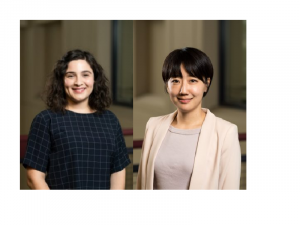Presented By: Department of Psychology
Developmental Brown Bag:
Jessica Montoro and Yeonjee Bae, Graduate Students, Developmental Psychology

Jessica Montoro:
Title:
Latinx Adolescents Facing Multiple Daily Stressors and the Protective Role of Familismo
Abstract:
Familism, or familismo, is a highly endorsed Latinx cultural value that encompasses using family members as attitudinal and behavioral exemplars, turning to family members as sources of support, and prioritizing the family’s well-being over the individual’s (Stein et al., 2014). Although several studies have examined whether familismo protects youth from one type of stressor at a time (e.g. community violence exposure, discrimination, substance abuse), few scholars have compared the differential effects of both general and cultural stressors on Latinx youth’s psychological functioning (Ayón et al., 2010; Stein et al., 2012). This study examined the potentially protective effects of familismo among Latinx adolescents facing a myriad of stressors, both cultural and general. Survey data for this study were drawn from a sample of 224 low-income, Latinx 9th graders (age M = 14.5) attending 3 high schools in the Northeastern United States. When both cultural and general stressors were accounted for, greater material need was associated with increased depressive symptoms and a less positive future orientation. Moreover, familismo endorsement protected adolescents from depressive symptoms linked to material hardship. Results suggest that cultural stressors may be less distressing to Latinx adolescents than more general stressors, like financial hardship, and familismo is an important cultural value that may help Latinx adolescents navigate various types of stressors.
Yeonjee Bae:
Title:
Do firstborn children’s responses to mothers interacting with a baby doll predict jealousy of a newborn sibling?
Abstract:
The birth of an infant sibling is a normative life experience for many young children. Parents are particularly interested in how their firstborn children will react to the birth of the infant sibling, yet few resources exist to assist parents in managing their children’s jealousy across the transition to siblinghood. The current study used an infant doll simulator as a social rival during a mother-child-doll laboratory task to elicit children’s jealousy reactions which were then used to predict children’s jealousy of their 1-month-old newborn sibling. Thirty pregnant mothers and their firstborn children participated in a short-term longitudinal study using the infant doll simulator in the lab before the birth (Time 1) and home observations of mother-child-baby 1 month after the birth (Time 2). There were differences in children’s behaviors across the two times and children’s reactions to the baby doll did not appear to predict their reactions to their newborn sibling, suggesting there is little predictive validity in the use of a baby simulator to understand children’s jealousy of an infant sibling.
Title:
Latinx Adolescents Facing Multiple Daily Stressors and the Protective Role of Familismo
Abstract:
Familism, or familismo, is a highly endorsed Latinx cultural value that encompasses using family members as attitudinal and behavioral exemplars, turning to family members as sources of support, and prioritizing the family’s well-being over the individual’s (Stein et al., 2014). Although several studies have examined whether familismo protects youth from one type of stressor at a time (e.g. community violence exposure, discrimination, substance abuse), few scholars have compared the differential effects of both general and cultural stressors on Latinx youth’s psychological functioning (Ayón et al., 2010; Stein et al., 2012). This study examined the potentially protective effects of familismo among Latinx adolescents facing a myriad of stressors, both cultural and general. Survey data for this study were drawn from a sample of 224 low-income, Latinx 9th graders (age M = 14.5) attending 3 high schools in the Northeastern United States. When both cultural and general stressors were accounted for, greater material need was associated with increased depressive symptoms and a less positive future orientation. Moreover, familismo endorsement protected adolescents from depressive symptoms linked to material hardship. Results suggest that cultural stressors may be less distressing to Latinx adolescents than more general stressors, like financial hardship, and familismo is an important cultural value that may help Latinx adolescents navigate various types of stressors.
Yeonjee Bae:
Title:
Do firstborn children’s responses to mothers interacting with a baby doll predict jealousy of a newborn sibling?
Abstract:
The birth of an infant sibling is a normative life experience for many young children. Parents are particularly interested in how their firstborn children will react to the birth of the infant sibling, yet few resources exist to assist parents in managing their children’s jealousy across the transition to siblinghood. The current study used an infant doll simulator as a social rival during a mother-child-doll laboratory task to elicit children’s jealousy reactions which were then used to predict children’s jealousy of their 1-month-old newborn sibling. Thirty pregnant mothers and their firstborn children participated in a short-term longitudinal study using the infant doll simulator in the lab before the birth (Time 1) and home observations of mother-child-baby 1 month after the birth (Time 2). There were differences in children’s behaviors across the two times and children’s reactions to the baby doll did not appear to predict their reactions to their newborn sibling, suggesting there is little predictive validity in the use of a baby simulator to understand children’s jealousy of an infant sibling.